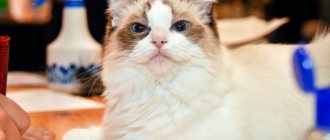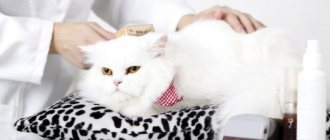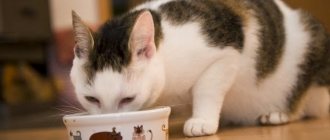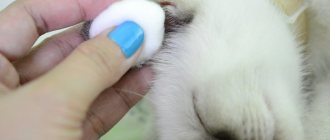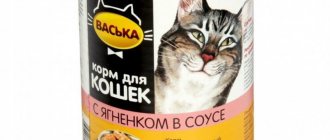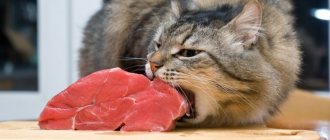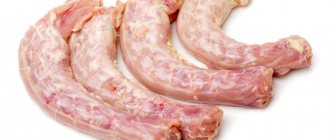Cats have long been human companions. Although they lived side by side with humans, they still preferred to eat separately and took care of their own diet. Cats are still our favorite pets. Many owners carefully shape their pet’s diet, but there are also those who act on the principle “the cat will not eat anything bad or unnecessary”; this attitude of owners quite often ruins the pet. And sometimes the owner, without knowing it, poisons the cat every day with certain products that cause serious illness and even death in the animal.
Proper nutrition for a domestic cat
Do not forget that over many centuries, cats have developed their own gene pool and physiological characteristics . So, cats are inherently predators and their entire body is adapted to digest meat products. Because of this, the digestive system and especially the liver are organized in such a way that they cannot immediately process large amounts of toxins and poisonous substances. Such substances may be contained in products that are absolutely safe for other animals or humans.
Even a small dose of the toxin, if consumed systematically, can lead to the death of your pet. So you should carefully monitor your cat’s diet at home and avoid mistakes. The list of questionable products for cats is long, but here we will consider an issue that causes a lot of doubt and controversy among cat owners.
If your cat loves tomatoes...
If your cat loves tomatoes...
Every responsible owner knows by heart the lists of foods that should not be given to cats. Very often, tomatoes, a vegetable poisonous to cats, also appear on these lists. But from time to time, stories appear on the Internet, including on our forum, about cats who happily eat pieces of red tomatoes. Let's figure out where the truth is and where the myth is.
Tomatoes, like eggplants, potatoes, sweet peppers or tobacco, belong to the nightshade family. All representatives of this family contain toxins in their fruits and leaves (the most famous of which, nicotine, is also isolated from the nightshade plant and tobacco). Some of these substances are safe for humans, so we can easily make ourselves a dish of eggplants and tomatoes, although we will feel an “astringent” sensation in the mouth if the vegetables were not quite ripe. Some of them are also dangerous for people - for example, toxins in henbane or dope, plants all from the same family.
But for cats, the glycoalkaloid toxins secreted by nightshades are much more dangerous: both because the body is less able to cope with them and because of their much lower body weight, which requires a much smaller dose. Moreover, they do not disappear when cooked - so beware of giving your cat potatoes or eggplant in any form.
What about tomatoes? If you study the sources, you can easily read that tomatoes and potatoes contain different toxins. If in the latter the main toxin is solanine, then in tomatoes there is almost no of it, and the less dangerous tomatine plays the “main violin” in them. Moreover, tomatine is present in large quantities in the leaves of the plant and unripe fruits, and the riper the tomato, the safer it is to eat.
So, the bottom line: a small piece of ripe red tomato will most likely not harm your cat, but giving any nightshade in large doses is highly not recommended.
Illustration: https://www.reddit.com/
Share with your friends! © KotoGallery 2015
Other materials in the section “Feeding cats”
- 10 mistakes when feeding pets
- Feeding your cat natural food
- Feeding a cat with industrial food
- Vegetarian cats?
- Festive menu for cats (recipes + tips)
- Seven foods cats should never eat
Useful materials:
- Cutaneous horn General description of the disease Cutaneous horn on the forehead or face (ICD 10 code - L57.0) -...
- Itching and odorless discharge Main causesBefore considering the factors that provoke the appearance of discharge that has a sour odor, it is necessary to immediately note...
- Normal temperature in animals Normal temperature in different types of animals Veterinary services Day hospital for animals Veterinary certificates Vaccination…
- Discharge in women What kind of discharge between menstruation is considered normal? Female discharge normally consists of mucus from the cervical canal, dead...
Can cats have nuts?
As mentioned earlier, cats are meat eaters, and the liver does not have enough aggressive enzymes that can cope with harmful substances. This immaturity of the liver is due to the long natural selection of cats. In the wild, cats ate nothing but birds, mice and other living creatures. And if products of plant origin entered the body, they got there along with the prey, and were already processed by the digestive system of the victim. Based on this, the cat’s liver has adapted to the fact that it does not need to process many harmful substances and its development has stopped at the same level. Today's domestic cats suffer greatly from this feature.
Nuts are strictly contraindicated for cats! They contain a large amount of phosphorus, which in excessive doses is dangerous for the animal. There are frequent cases of poisoning of cats with phosphorus-containing products. The symptoms of such poisoning are difficult to miss: the animal becomes weak, refuses food and water, and begins to vomit severely. There is no need to delay treatment; this condition does not go away on its own. Also, during treatment, it is worth removing from the diet all fat-containing foods, which, in combination with phosphorus, put additional stress on the cat’s liver.
It is recommended to give more water and avoid milk during this period. The second good reason for banning the consumption of nuts is their fat content. The digestive system and liver are again not able to cope with such a test, this is fraught with the development of severe liver failure in cats. This condition is more difficult to treat. Nuts are also dangerous because they contain toxic substances and allergens. Allergies and damage to internal organs may not appear immediately, but therapy and the high risk of complications will cause a lot of trouble for the owner.
Cats and salt
Salted nuts are even more dangerous for cats; salt is toxic to them. The following symptoms of salt poisoning exist:
- Vomit
- Diarrhea
- Loss of appetite
- Lethargy
- Tremor
- Convulsions
- Frequent urination and/or thirst
- Kidney damage
- Coma
Treatment for salt poisoning varies and may include intravenous fluids, treatment for dehydration, electrolyte monitoring, supportive care, and treatment of cerebral edema. Please note that you may also have other sources of salt in your home: salt lamps, sea water, table salt, rock salt, homemade plasticine, etc.
If you think your cat has eaten salt, contact your veterinarian immediately.
Walnuts, almonds and macadamia nuts
These types of nuts are deadly for cats . And even a small amount of them can kill a pet. And macadamia nuts are overloaded with a potent toxin for cats. Poisoning with such a substance causes severe damage to the nervous and digestive systems of cats, causing severe spasms and convulsions in all muscle groups.
Features of the digestive system
Cats are predators, everyone knows that. The process of hunting itself gives them unimaginable pleasure. Well, it’s quite natural that the hunt ends with a catch of prey. Cats are calculating and smart in their jumps, which means that very often the hunt ends with the extraction of meat. Their intestines and teeth are designed so that they can eat raw meat, tearing apart their prey. Where can we get away from the genes of predatory ancestors? After all, this is the only food that cats could get while living in the wild. They could also chew grass for medicinal purposes; this, perhaps, was all their food.
But domesticated cats are luckier. Their diet is quite extensive and consists not only of meat. Caring owners add fish, vegetables, dairy products, eggs, grains, cereals and sometimes goodies to it. It is the goodies that are the most dangerous for a cat, and this is a fairly large list of products that you need to know by heart :
- chocolate,
- nuts,
- mushrooms,
- potato,
- beans and all legumes,
- alcohol,
- tomatoes,
- garlic and onion,
- grape,
- citruses.
Can cats eat peanuts? — lifestyle — 2021
Cats have always lived next to humans. For many centuries in a row. In the old days, of course, there was no ready-made food and they were fed whatever was available. From your desk, so to speak. With meat, everything is clear; cats love it. But not every owner of a furry friend knows whether cats can eat nuts.
Many people adhere to the rule that a cat is an intelligent animal and will not eat foods that are harmful to itself. Often, such an opinion can serve as the beginning of the development of serious diseases precisely because of improper feeding of your pet and indulging its desires. After all, how touching it can sometimes be to look at a picture of a cat catching another mischief from the owner’s table and raising its paws funny at the same time and meowing funny. The owners have fun that is sometimes destructive for the cat.
The cat's body and plant foods
To better understand how a cat's organs and systems function and how domestication has affected them, it's worth taking a closer look at cat anatomy:
- As already mentioned, domestic mustachioed striped animals have not lost their predatory nature and still remain “meat eaters”.
- During the process of long-term natural selection, their liver acquired some immaturity, since it ceased to produce large amounts of enzyme substances capable of neutralizing toxic components.
- Wild cats today feed on birds, mice and other living creatures, just like their ancestors. And food of plant origin most often enters their body along with prey, having already been processed by the digestive tract of animals or birds. Therefore, the liver of cats is not adapted to process a large number of harmful components and has long ceased to develop in this direction.
This feature of the body is often harmful for domestic cats, since their diet sometimes consists of foods that are not at all suitable for feeding predators.
Prohibited Products
Let's take a closer look at products that are harmful, and sometimes even dangerous for cats. What not to feed our furry pets. Once in the animal's body, it can cause an attack of arrhythmia, affect rapid heartbeat and have a diuretic effect. This is if you feed your cat chocolate regularly. If she eats chocolate from time to time, hyperactivity can be observed, and cats also begin to feel thirsty. Eating too much chocolate at one time can trigger a heart attack, as well as cause vomiting and diarrhea. As you can see, cute entertainment can cause serious damage to a cat’s health.
Conditionally hazardous foods for cats - may pose a health risk
The following list is those products that do not pose a threat to the pet’s life, but can be harmful to health or will simply be useless.
| The product's name | Negative effects |
| River fish, especially raw | It is not recommended to give cats any raw fish. But the greatest danger is posed by raw river fish, as it can be infected with helminths. Fish can also provoke urolithiasis due to its mineral composition. |
| Milk | After breastfeeding ends, milk should be excluded from the cat's diet. Many cats cannot digest lactose and drinking milk will cause diarrhea. Even if your cat digests milk, there is no benefit from it for an adult pet. |
| Mushrooms | They are difficult to digest food, so it is better not to include mushrooms in your cat’s diet. May cause digestive disorders. |
| Raw chicken and pork, raw eggs | Raw chicken and eggs may contain salmonella. Raw pork may contain parasites and pathogens. Also, fatty pork should not be given to cats. Boiled pork without fat in moderate quantities is not harmful to cats and is even beneficial. |
| Bread and pasta | May cause intestinal upset and flatulence. In very small quantities, bread is not contraindicated. |
| Sunflower seeds | Since the product contains a lot of fat, you should limit this product in your cat's diet. 5-10 seeds will not harm, but more may cause vomiting. |
| Canned products – any: meat, fish, vegetables | Seaweed, canned peas and corn - my Mars would eat these foods without restrictions. However, canned vegetables lead to gastrointestinal upset and vomiting. 3-5 peas will not harm, but you should not give more. Moreover, sugar, salt and spices are added to many canned foods. |
| Salt, spices and spicy foods | There is no need to salt the food you prepare for your pet. Salt disrupts electrolyte balance and can lead to kidney problems in cats, especially neutered ones. |
| Legumes | May cause flatulence. |
| Liver | Liver can be given to cats very rarely. But it is better to completely abandon this product. Raw liver causes diarrhea and may also contain parasites. Boiled liver can cause constipation. Beef liver contains too much vitamin A, which can lead to hypervitaminosis in a cat. |
| High fat foods - oils, lard, duck and goose | Eating fatty foods in large quantities leads to pancreatitis in cats, as well as obesity. |
| Sausage and sausages | Processed meat contains a lot of salt, spices and fat - excessive consumption can lead to pancreatitis and urolithiasis. |
Vegetables are safe for cats
The basic rules for safely feeding cats vegetables come down to just three points. First, vegetables should make up no more than 10% of the daily intake (about 2-3 teaspoons, depending on the weight and size of the animal). Secondly, they are given exclusively boiled or steamed, since raw ones are difficult for the animal to absorb, they are more difficult to digest and can get stuck in the throat, causing suffocation. Thirdly, vegetables are cut into small pieces that are convenient for the animal to eat, or crushed into puree and mixed with the main food (except dairy products) or given separately.
Only a small list of vegetables is considered safe for cat health. In addition to leafy vegetables (lettuce, the darker the leaf, the better), which are effective in removing hairballs from your pet’s stomach and intestines, you can feed your pet:
- Carrots that many pets love.
- Zucchini is rich in magnesium, manganese and potassium.
- Broccoli contains antioxidants.
- Asparagus, which is a source of fiber and vitamins.
- Green beans, which are an excellent source of fiber and are enjoyed by many cats.
- Cucumbers that do not need to be boiled, but are better served fresh. Some pets adore them, perhaps because they quench their thirst.
- Celery, rich in vitamins and microelements.
- Melon, given in small quantities, peeled and seeded.
It is known that cats cannot taste sweets. But some meowing pets are a fan of melon and enjoy eating watermelon, peaches, and blueberries.
It is better to avoid other vegetables and fruits and not try to include them in the diet of a meowing pet. Because to varying degrees they are either difficult to digest or toxic to cats. Under no circumstances should you give onions, garlic, grapes, raisins, or avocados - they are extremely toxic to animals. They can cause simple digestive upset or lead to severe poisoning, depending on the dosage. For example, raisins can cause sudden kidney failure, and onions and garlic lead to the development of anemia.
It should be remembered that you need to introduce vegetables into your cat’s diet gradually, separately and in small quantities.
It is important to evaluate the body’s reaction to a new product, as well as the pet’s desire to eat a specific vegetable. If the pet refuses, then there is no need to insist.
If after consumption there is an upset stomach (diarrhea, bloating), then there is no need to give it to the animal anymore.
You should take care of pets that tend to chew indoor plants. They may refuse vegetables, but they will not refuse grass grown specifically for them, for example, sprouted oats. The herb helps cleanse the stomach and intestines and is rich in vitamins and microelements.
How to keep meat safe
To prevent your cat from becoming infected with worms by eating meat, the product must be well prepared beforehand. The owner won’t have to do anything complicated. In order to destroy parasite eggs, their larvae and even adults, it is enough to freeze the meat for 50 hours. No matter how resilient worms are, they cannot withstand prolonged exposure to sub-zero temperatures. After cooling, the meat becomes completely safe and can be given to your cat without worrying about its health.
If meat is bought at the market from an open counter, where flies that carry many diseases could land on it, it must also be processed before giving it to the cat so as not to bring infectious diseases to the pet with it. To do this, you need to pour boiling water over the product, but do not keep it in it, so that the beneficial substances in the meat are not destroyed.
Prohibited Products
Let's take a closer look at products that are harmful, and sometimes even dangerous for cats. What not to feed our furry pets.
Chocolate, products containing cocoa. You can often see videos posted online, showing how funny a cat looks, jumping up and catching pieces of chocolate in flight. A funny video, a sea of positive emotions and undeniable harm caused to the cat's health. The thing is that chocolate contains the substance theobromine, which is quite toxic to the cat’s body.
Once in the animal's body, it can cause an attack of arrhythmia, affect rapid heartbeat and have a diuretic effect. This is if you feed your cat chocolate regularly. If she eats chocolate from time to time, hyperactivity can be observed, and cats also begin to feel thirsty. Eating too much chocolate at one time can trigger a heart attack, as well as cause vomiting and diarrhea. As you can see, cute entertainment can cause serious damage to a cat’s health.
Does your cat eat peanuts?
These are all broad guidelines and conclusions based on research. My cat has never shown any interest in peanuts, and to be honest, I have never asked her opinion about these legumes.
What about your cats? Do your cats enjoy the occasional peanut? Have you seen any interesting videos online of cats trying to eat peanut butter? Is your cat allergic to peanuts? Share your experience with the comments!
Find out more about your cat with Catster:
- Can cats eat popcorn?
- Can Cats Eat Granola?
- I'm willing to bet your cat hates his litter box - here's why
- Unusual Cat Facts: 8 Reasons Why Your Cat Loves to Lick You
- Our best tips for getting your cat to let you sleep


